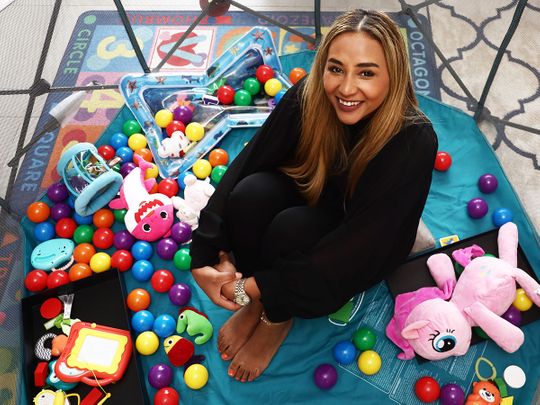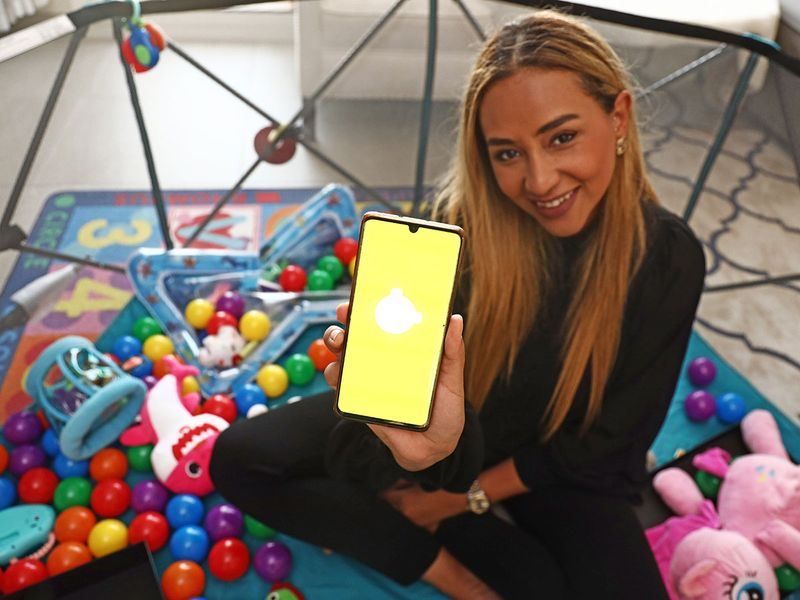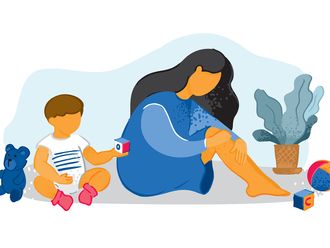
“People said, ‘I’m never going to put my kids on [dating app] Tinder – this is Tinder for kids’,” recalls Shamim Kassibawi, Founder of the Play:Date app.
The UAE-based mum entrepreneur is replaying her conversations with friends back in the early 2010s. “They said, ‘This is against our culture’,” she says.
Years on, not only did the 34-year-old get the business idea off the ground, she also threw off the threatening chains of COVID-19 and emerged victorious – she had found a way to, during a pandemic, moneitise the idea.
What is the Play: Date app?
The Play:Date app is essentially a forum where parents can connect to one another and set up a time where their kids can connect, play and they can have some adult conversation. For a new mum, these connections are especially important.
ALSO READ
- Rise of Petrochem CEO Yogesh Mehta: From a monthly salary of Dh2,000 to owning a billion dollar firm in Dubai
- From kitchen porter to restaurateur, this is how Swades restaurant’s Jagdishbhai Thanki established a name for himself in Dubai after living here for over 40 years
- Video: From a jobless man in UAE to serving Justin Bieber, A.R. Rahman
- How Dubai-based YouTube star Veena Jan went from victim to food vlogger with 2.19 million followers
“I actually came up with Play:Date when I was still single, because I thought so many lonely mums and so many people moving in and out of Dubai and the timing… like the dad working full time and the mum who’s at home. And let’s be honest, not everybody can afford nurseries so early these days. So a lot of babies are stuck at home until they are like, four. So I came up with the concept – it was a very human kind of concept,” she says.
But Kassibawi was worried about going all in. “I wasn’t a mum; I’m a mum now but I wasn’t a mum back then,” she says.
She rested the idea for a while - unconsciously creating a business strategy, thinking of her network and the resources she could mine from it.
“I spoke to my network and I found the right people to team up with me on it. Unfortunately, they didn’t want to take the risk on me, so they came in at 30-70 [per cent]. One was this amazing creative guy and one has contact with app developers. So it was my vision [and] my concept, and I described it to the creative guy, he built it and then we moved on to building it [into an app] and making a beta version.
“Can you believe that I spent three years with people saying to me, this is never going to work?” she asks.
Research is key – and proof of concept
“I spent a lot of time in mummy groups in the UAE, screenshotting them, there were tens of thousands of comments on these groups of people saying, ‘Hey I have a two year old. I’m looking for friends in this area. Are you guys interested in a play date?’ Which is what my app was trying to give them. So I waited and I built beta. What I did was – any money I would save, I would put towards it. Which is why it took me a while to launch. We launched it in 2017 – it was Mother’s Day and we launched on iOS back then. And from there, I saved some more money, we made a few corrections, so by the end of the year we were ready to drop an Android version. And then I saved a little bit of money and launched Android. And then I saved a little bit of money and we made corrections and so on and so forth, and this is why it’s 2021 and I’m only coming out with it now. In the beginning of 2020, we were funded $250,000 from a New York-based backer.”

Nobody told me how hard [motherhood is]… everyone says mommy rewards – it’s so hard.... There’s hustle and then there’s mommy hustle; there’s tiredness and then there’s mommy tiredness.
Kassibawi, who traces her roots to Sudan and New Zealand, says sometimes she didn’t think the effort on the business was worth it. “I’m not going to lie, for a long time I would just stop and curl up and just leave it for a month or two. But I would always go back, because the more knowledge you get, the more you are motivated,” she explains.
You need to believe in yourself
The expat believes in putting your money where your ideas are. “[One] thing I encourage entrepreneurs to do is, put your own money first. The more you invest, the more you show people that you are putting yourself on the line. Some people come up with an idea and they say, ‘oh, let’s go get an investor’, and it really doesn’t work like that. You need to take the risk first – you need to build yourself first as much as possible and build value to your company. I mean, the first money I got, we were already valued at $2.5 million,” she says, pride lacing her voice.
Early days of pregnancy
Kassibawi got pregnant in 2020 months before COVID-19 brought the world to a standstill. It was then that she was at an entrepreneurship event showcasing Play:Date. She recalls, “They had no chairs for start-ups.
“I didn’t have a chair – I was 2 to 3 months pregnant. I was hiding my stomach – at this point, I had put on a little bit of weight, so you couldn’t really tell. I had to stand and what I noticed was there were [only] two other females in that same section I was in.
“Being pregnant was really hard for me because this incident happened and then we went into lockdown and honestly, I couldn’t tell any of my [US-based] investors or anybody that I was pregnant. Because a part of me thought they are going to think, ‘oh she’s not taking this seriously or she’s going to drop the ball’.”
Kassibawi’s background in handling press – she has a PR agency – helped her build her brand and to get it into homes. At 5 months pregnant and at the height of the coronavirus spike, she managed to monetise Play:Date.
Juggling motherhood and work
Months on and a birth later, things got a whole lot harder. “Nobody told me how hard [motherhood is]… everyone says mummy rewards – it’s so hard, it’s so depressing. I had a difficult birth so I was in hospital for seven days,” she says. “I ended up with a C-section; there was a complication and my baby developed an infection and was in ICU.
“Motherhood also brings with it so much pressure on you and your husband. Also, I didn’t obviously take maternity leave because I had a lot going on. I think the best advice I can give any mum is just take one day at a time and go easy on yourself.”

Taking charge at home
She has taught herself not to rely too much on her support system. “I am very structured and when I spend time with my baby, I actually have opted for a live-out nanny. Because I know myself, if I had a live-in nanny I’m just going to say, ‘oh, you do dinner time, oh, you do bath time, you do bed time’. And Fridays I make sure I spend with my baby. I think, set time that is time with your baby, so you don’t get mommy guilt. We all get mommy guilt,” she explains.
Being a mother is a full-time job, she adds. “I honestly think sometimes I have just finished my job and I’m going to start my second one. I’m very lucky because I’m working from home. But I think go easy on yourself and go easy on your body. Do what you enjoy – if you want to be a full-time mum that’s absolutely fine, if you want to juggle and find a part-time job that’s good for you as well. Once a week, I speak to a mum. And I help her find a new path or develop something for herself – it’s my investment in the community.”
As for relationships and the bashing they take when you are a mum entrepreneur, that’s something you can consciously fight, she says. “In life, you have to invest into you. It’s like exercise, if you are not exercising three times a week you are not going to see results. Marriage is the same; your relationship with your child is the same; your relationship with your friends is the same. But I’ll tell you one thing. There’s hustle and then there’s mommy hustle; there’s tiredness and then there’s mommy tiredness – and I’m not someone who complains about anything. Being a mother has been one of the hardest jobs I’ve ever done in my life.”
But it does come with time-outs. And play dates. And with some work, you can have it all.
Do you have a story to share? Write in to us at parenting@gulfnews.com








